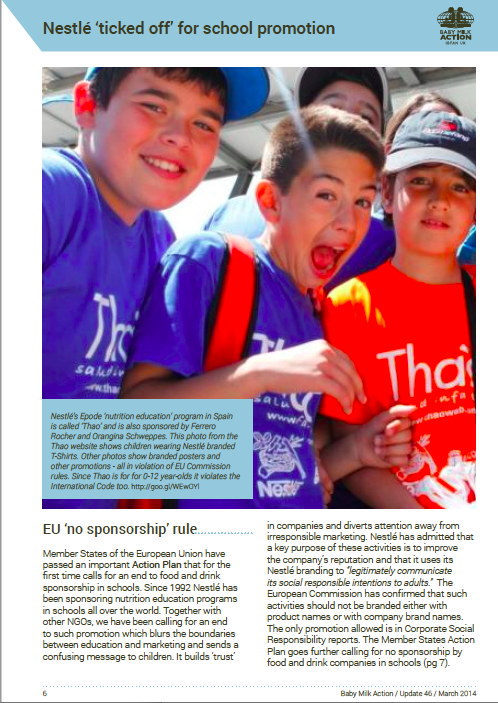
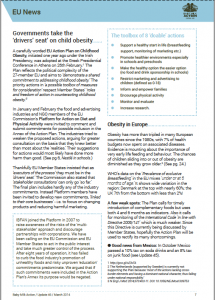
“The Special Rapporteur looks with concern at the rapid increase in the number of private education providers and the resulting commercialization of education, and examines the negative effects of this on the norms and principles underlying the legal framework of the right to education as established by international human rights treaties.” Report of the Special Rapporteur on the right to education,Kishore Singh, Protecting the right to education against commercialization* June 2015
“All too often the education process is entrusted to people who appear to have no understanding of industry and the path of progress…The provision of education is a market opportunity and should be treated as such” European Round Table of Industrialists, 1988
Why companies want to sponsor education
Baby food companies have been aware of the effectiveness of sponsoring health workers and the information parents receive for decades. 20 years ago – in 1996 – the WHA Resolution 49.15 greatly strengthened the International Code when it focused on conflicts of interest and warned against company interference.
The Resolution noted with Concern “… that health institutions and ministries may be subject to subtle pressure to accept, inappropriately, financial or other support for professional training in infant and child health” It went on the urge Member States to ensure that: “financial support for professionals working in infant and young child health does not create conflicts of interest.”
The UK Government’s policy on schools could threaten the rights of future generations to education that is free from commercial influence.
UK Government website: Types of School 1. Overview: All children in England between the ages of 5 and 16 are entitled to a free place at a state school. Most state schools have to follow the national curriculum. The most common ones are:community schools, controlled by the local council and not influenced by business or religious groups, foundation schools, with more freedom to change the way they do things than community schools academies, run by a governing body, independent from the local council – they can follow a different curriculum…Some academies have sponsors such as businesses, universities, other schools, faith groups or voluntary groups. Sponsors are responsible for improving the performance of their schools.( UK Gov website accessed 25.3.16 )
‘Gagging Clause’ put on hold:
In February 2016 the UK government announced that they were considering that a new clause to be inserted into all new grant agreements banning organisations receiving government grants from using taxpayer funds to lobby government and Parliament. The following costs are not Eligible Expenditure: Payments that support activity intended to influence or attempt to influence Parliament, government or political parties, or attempting to influence the awarding or renewal of contracts and grants, or attempting to influence legislative or regulatory action.” (2)
By 8th June 2016: Matt Hancock MP, the Minister for the Cabinet behind the anti-advocacy clause wrote in response to a superb letter from Kath Dalmeny of Sustain to say that the Government was:
· Still committed to a clause, but paused for review.
· Still committed to preventing taxpayer funds from being “wasted on improper lobbying for new regulation or for more government funding”.
· He acknowledged “some very real concerns” from interested parties. And “unintended consequences”.
· He committed to a review, and that Sustain’s submission, and others, will be considered in that review.
_________________________________
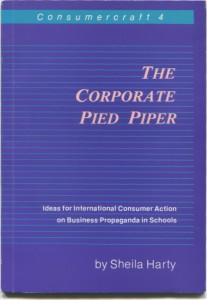 I started thinking about the risks of corporate funding of children’s education when I read Sheila Harty’s marvellous booklet, The Corporate Pied Piper – ideas for International Consumer Action on Business Propaganda in Schools. (IOCU 1985).
I started thinking about the risks of corporate funding of children’s education when I read Sheila Harty’s marvellous booklet, The Corporate Pied Piper – ideas for International Consumer Action on Business Propaganda in Schools. (IOCU 1985).
My fears grew, when, in 1992, Nestlé started its Healthy Kids programs in schools all over the world. (Nestlé now admits that a key purpose of its schools nutrition program sponsorship is to improve the company’s reputation. When challenged by the European Commission about branding, they argue that its needed used to ‘legitimately communicate its social responsible intentions to adults.’)
In 1995 Nestlé sponsored (in secret) a multimedia CD called The Controversy Over the Marketing of Breast Milk Substitutes, promoting this as an independent case study for students. (For more on this see Nestlé rewrites History below).
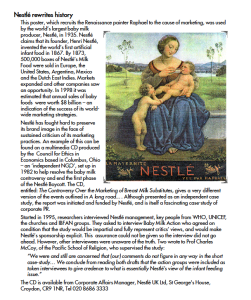
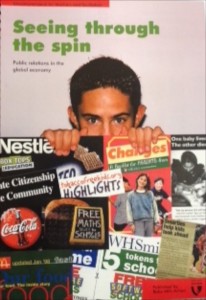
Education materials are a more complex problem than straightforward advertising because they blur the boundaries between advertising, marketing and independent information. Our EU Commission-Funded Education Pack Seeing through the Spin, public relations in the global economy (free online) was published in 2000 and aimed to help students deconstruct public relations messages – from companies and their critics. Schools Feb 12
Corporations have multiple motives when sponsoring and will hope to:
- involve potential critics in partnerships and so discourage them from speaking out;
- discourage open debate about sponsors
- undermine the independence of monitoring schemes;
- use education facilities to channel commercial propaganda and undermine public health messages;
- project a healthy, responsible corporate image and so gain the trust of children, parents and teachers;
- distort the curriculum in favour of business interests – promoting a self regulation and partnership approach to marketing rather than regulation;
- use the ‘halo’ effect as evidence of Corporate Social Responsibility (CSR)
- divert attention from/‘engineer consent’ for actions which are anti-social and which harm sustainable development, the environment and human survival.
- Divert attention from the corporate fiduciary duty to maximise profits.
EU ‘no sponsorship’ rule 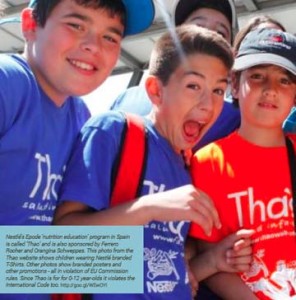
Nestlé’s Epode ‘nutrition education’ program in Spain is called ‘Thao’ and is also sponsored by Ferrero Rocher and Orangina Schweppes. This photo from the Thao website shows children wearing Nestlé branded T-Shirts. Other photos show branded posters and other promotions – all in violation of EU Commission rules. Since Thao is for for 0-12 year-olds it violates the International Code too. http://goo.gl/WEwOYl
In 2014 Member States of the European Union passed an important Action Plan that for the first time calls for an end to food and drink sponsorship in schools. The European Commission has confirmed that such activities should not be branded either with product names or with company brand names. The only promotion allowed is in Corporate Social Responsibility reports. The Member States Action Plan goes further calling for no sponsorship by food and drink companies in schools (pg 7).
The WHA Resolutions 1996 (WHA 49.15) and 2005 (WHA 58.32) state that: “health institutions and ministries may be subject to subtle pressure to accept, inappropriately, financial or other support for professional training in infant and child health” and urge Member States to ensure that “the financial support for professionals working in infant and young child health does not create conflicts of interest”
The EU Nutrition Strategy identifies the need to know more about the “drivers for preventing obesity in target groups such as infants, children and adolescents” identifies schools as important settings which should be protected environments and calls for any partnerships to be undertaken in a transparent and non-commercial way
WHO SET OF RECOMMENDATIONS ON THE MARKETING OF FOODS AND NON-ALCOHOLIC BEVERAGES TO CHILDREN Adopted by World Health Assembly Resolution WHA 63.14
Para 20:“Schools, child-care and other educational establishments are privileged institutions acting in loco parentis, and nothing that occurs in them should prejudice a child’s well-being. erefore the nutritional well-being of children within schools should be paramount and the foundation stone for children’s well being at this formative age. is is also consistent with the recommendation made in the Global Strategy on Diet, Physical Activity and Health that urges governments to adopt policies to support healthy diets in schools.”
REC5: Settings where children gather should be free from all forms of marketing of foods high in saturated fats, trans-fatty acids, free sugars, or salt. Such settings include, but are not limited to, nurseries, schools, school grounds and pre-school centres, playgrounds, family and child clinics and paediatric services and during any sporting and cultural activities that are held on these premises
Para 24. Independently of any other measures taken for implementation of a national policy, private sector stakeholders should be encouraged to follow marketing practices that are consistent with the policy aim and objective set out in these recommendations and to practice them globally in order to ensure equal consideration to children everywhere and avoid undermining efforts to restrict marketing in countries that receive food marketing from beyond their borders.
Governments take the ‘drivers’ seat’ on child obesity
The EU Action Plan on Childhood Obesity, initiated under the Irish Presidency was adopted at the Greek Presidential Conference in Athens on 26th February 2014. The Plan reflects the political complexity of the 27-member EU and aims to ‘demonstrate a shared commitment to addressing childhood obesity.’ The priority actions in ‘a possible toolbox of measures for consideration’ respect Member States’ ‘roles and freedom of action in counteracting childhood obesity.’2
The toolbox of 8 ‘doable’ actions
● Support a healthy start in life (breastfeeding support, monitoring f marketing etc.)
● Promote healthier environments especially in schools and preschools
● Make the healthy option the easier option (no food and drink sponsorship in schools)
● Restrict marketing and advertising to children (defined as 0-18)
● Inform and empower families
● Encourage physical activity
● Monitor and evaluate
●Increase research.
A little bit of History
Parents Opposed to Opting Out
Between 1988 and 1998 the Conservative government as part of its programme of create “greater diversity in educational provision” and to weaken the influence of local education authorities tried to persuade schools to opt for Grant-maintained (GM) status. Like today’s Academies GM schools were owned and managed by their own boards of school governors, rather than the local authority. Proposals to convert to grant-maintained status could be initiated by the governing body or by a number of parents, but would then be determined by a ballot of parents.
In 1994 I helped found a national parent’s group, Parents Opposed to Opting Out that campaigned to help schools (parents and governors) see the risks “Opting Out’ of Local Authorities. With £10,000 of funding from the Wainwright Foundation, we helped persuade the new Labour Government to end the Grant Maintained schools push. (3) Sadly Labour replaced it in 2000 with the City Academy scheme. In 2010 the Conservatives came back into power and the Academies Act was one of the first Acts they passed.
Nestlé rewriting history
In 1995 Nestlé funded a multimedia CD called The Controversy Over the Marketing of Breast Milk
Substitutes produced by the Council for Ethics in Economics based in Columbus, Ohio – an ‘independent NGO’, set up in 1982 to help resolve the baby milk controversy and end the first phase of the Nestlé Boycott. The CD, entitled: The Controversy Over the Marketing of Breast Milk Substitutes, gives a very different version of the events outlined in A long road… . Although presented as an independent case study, the report was initiated and funded by Nestlé, and is itself a fascinating case-study of corporate PR.
In preparation for the CD, CEE researchers interviewed Nestlé management, key people from WHO, UNICEF, the churches and IBFAN groups. They asked to interview us and we agreed on condition that the study would be impartial and fully represent critics’ views, and that Nestlé’s sponsorship would be explicit. This assurance could not be given we weren’t interviewed. However, other interviewees were unaware of the truth. Two wrote to Prof Charles McCoy, of the Pacific School of Religion, who supervised the study: “We were and still are concerned that (our) comments do not figure in any way in the short case-study… We conclude from reading both drafts that the action groups were included as token interviewees to give credence to what is essentially Nestlé’s view of the infant feeding issue.”
Refs:
1. http://www.right-to-education.org/node/229
2. http://www.right-to-education.org/news/un-human-rights-experts-make-ground-breaking-statements-privatisation-education-ghana-chile-and
2 Government announces new clause to be inserted into grant agreements 6 February 2016 https://www.gov.uk/government/news/government-announces-new-clause-to-be-inserted-into-grant-agreements
3 Attack on ‘incomprehensible’ policy incenses Blunkett The Guardian 5.10.1995 http://gu.com/p/jmfb/sbl
Article 36 of the Convention on the Rights of the Child: “States Parties shall protect the child against all other forms of exploitation prejudicial to any aspects of the child’s welfare.”
********
Article 32: “States Parties recognize the right of the child to be protected from economic exploitation and from performing any work that is likely to be hazardous or to interfere with the child’s education, or to be harmful to the child’s health or physical, mental, spiritual, moral or social development.”
********
Article 24 (e) To ensure that all segments of society, in particular parents and children, are informed, have access to education and are supported in the use of basic knowledge of child health and nutrition, the advantages of breastfeeding, hygiene and environmental sanitation and the prevention of accidents;
********
Acceptability Students should not be expected to conform to any specific religious or ideological views. Methods of teaching should be objective and unbiased and material available should reflect a wide array of ideas and beliefs.(1)
(Geneva, 24 June 2015) Two United Nations (UN) human rights expert bodies have this week issued ground-breaking statements that raise the alarm about the growth and effects of privatisation of education in Ghana, Chile, and Uganda, and made strong recommendations to address them…They confirm that a rapid trend of unregulated privatisation in education is taking place in many countries, in particular the lower income ones, which in several instances amount to violations of international human rights law. (2) – See more at: http://www.right-to-education.org/news/un-human-rights-experts-make-ground-breaking-statements-privatisation-education-ghana-chile-and#sthash.8JbeGERA.dpuf
– See more at: http://www.right-to-education.org/news/un-human-rights-experts-make-ground-breaking-statements-privatisation-education-ghana-chile-and#sthash.8JbeGERA.dpuf
